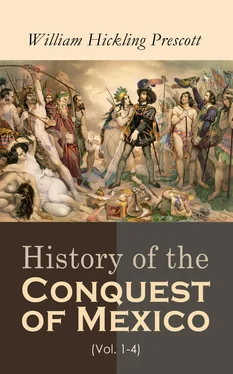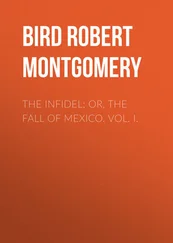I have occupied so much space with this illustrious prince that but little remains for his son and successor, Nezahualpilli. I have thought it better, in our narrow limits, to present a complete view of a single epoch, the most interesting in the Tezcucan annals, than to spread the inquiries over a broader but comparatively barren field. Yet Nezahualpilli, the heir to the crown, was a remarkable person, and his reign contains many incidents which I regret to be obliged to pass over in silence. [340]
He had, in many respects, a taste similar to his father’s, and, like him, displayed a profuse magnificence in his way of living and in his public edifices. He was more severe in his morals, and, in the execution of justice, stern even to the sacrifice of natural affection. Several remarkable instances of this are told; one, among others, in relation to his eldest son, the heir to the crown, a prince of great promise. The young man entered into a poetical correspondence with one of his father’s concubines, the lady of Tula, as she was called, a woman of humble origin, but of uncommon endowments. She wrote verses with ease, and could discuss graver matters with the king and his ministers. She maintained a separate establishment, where she lived in state, and acquired, by her beauty and accomplishments, great ascendency over her royal lover. [341]With this favorite the prince carried on a correspondence in verse,—whether of an amorous nature does not appear. At all events, the offence was capital. It was submitted to the regular tribunal, who pronounced sentence of death on the unfortunate youth; and the king, steeling his heart against all entreaties and the voice of nature, suffered the cruel judgment to be carried into execution. We might, in this case, suspect the influence of baser passions on his mind, but it was not a solitary instance of his inexorable justice towards those most near to him. He had the stern virtue of an ancient Roman, destitute of the softer graces which make virtue attractive. When the sentence was carried into effect, he shut himself up in his palace for many weeks, and commanded the doors and windows of his son’s residence to be walled up, that it might never again be occupied. [342]
Nezahualpilli resembled his father in his passion for astronomical studies, and is said to have had an observatory on one of his palaces. [343]He was devoted to war in his youth, but, as he advanced in years, resigned himself to a more indolent way of life, and sought his chief amusement in the pursuit of his favorite science, or in the soft pleasures of the sequestered gardens of Tezcotzinco. This quiet life was ill suited to the turbulent temper of the times, and of his Mexican rival, Montezuma. The distant provinces fell off from their allegiance; the army relaxed its discipline; disaffection crept into its ranks; and the wily Montezuma, partly by violence, and partly by stratagems unworthy of a king, succeeded in plundering his brother monarch of some of his most valuable domains. Then it was that he arrogated to himself the title and supremacy of emperor, hitherto borne by the Tezcucan princes as head of the alliance. Such is the account given by the historians of that nation, who in this way explain the acknowledged superiority of the Aztec sovereign, both in territory and consideration, on the landing of the Spaniards. [344]
These misfortunes pressed heavily on the spirits of Nezahualpilli. Their effect was increased by certain gloomy prognostics of a near calamity which was to overwhelm the country. [345]He withdrew to his retreat, to brood in secret over his sorrows. His health rapidly declined; and in the year 1515, at the age of fifty-two, he sank into the grave; [346]happy, at least, that by this timely death he escaped witnessing the fulfilment of his own predictions, in the ruin of his country, and the extinction of the Indian dynasties forever. [347]
In reviewing the brief sketch here presented of the Tezcucan monarchy, we are strongly impressed with the conviction of its superiority, in all the great features of civilization, over the rest of Anahuac. The Mexicans showed a similar proficiency, no doubt, in the mechanic arts, and even in mathematical science. But in the science of government, in legislation, in speculative doctrines of a religious nature, in the more elegant pursuits of poetry, eloquence, and whatever depended on refinement of taste and a polished idiom, they confessed themselves inferior, by resorting to their rivals for instruction and citing their works as the masterpieces of their tongue. The best histories, the best poems, the best code of laws, the purest dialect, were all allowed to be Tezcucan. The Aztecs rivalled their neighbors in splendor of living, and even in the magnificence of their structures. They displayed a pomp and ostentatious pageantry truly Asiatic. But this was the development of the material rather than the intellectual principle. They wanted the refinement of manners essential to a continued advance in civilization. An insurmountable limit was put to theirs by that bloody mythology which threw its withering taint over the very air that they breathed.
The superiority of the Tezcucans was owing, doubtless, in a great measure to that of the two sovereigns whose reigns we have been depicting. There is no position which affords such scope for ameliorating the condition of man as that occupied by an absolute ruler over a nation imperfectly civilized. From his elevated place, commanding all the resources of his age, it is in his power to diffuse them far and wide among his people. He may be the copious reservoir on the mountain-top, drinking in the dews of heaven, to send them in fertilizing streams along the lower slopes and valleys, clothing even the wilderness in beauty. Such were Nezahualcoyotl and his illustrious successor, whose enlightened policy, extending through nearly a century, wrought a most salutary revolution in the condition of their country. It is remarkable that we, the inhabitants of the same continent, should be more familiar with the history of many a barbarian chief, both in the Old and New World, than with that of these truly great men, whose names are identified with the most glorious period in the annals of the Indian races.
What was the actual amount of the Tezcucan civilization it is not easy to determine, with the imperfect light afforded us. It was certainly far below anything which the word conveys, measured by a European standard. In some of the arts, and in any walk of science, they could only have made, as it were, a beginning. But they had begun in the right way, and already showed a refinement in sentiment and manners, a capacity for receiving instruction, which, under good auspices, might have led them on to indefinite improvement. Unhappily, they were fast falling under the dominion of the warlike Aztecs. And that people repaid the benefits received from their more polished neighbors by imparting to them their own ferocious superstition, which, falling like a mildew on the land, would soon have blighted its rich blossoms of promise and turned even its fruits to dust and ashes.
Fernando de Alva Ixtlilxochitl, who flourished in the beginning of the sixteenth century, [348]was a native of Tezcuco, and descended in a direct line from the sovereigns of that kingdom. The royal posterity became so numerous in a few generations that it was common to see them reduced to great poverty and earning a painful subsistence by the most humble occupations. Ixtlilxochitl, who was descended from the principal wife or queen of Nezahualpilli, maintained a very respectable position. He filled the office of interpreter to the viceroy, to which he was recommended by his acquaintance with the ancient hieroglyphics and his knowledge of the Mexican and Spanish languages. His birth gave him access to persons of the highest rank in his own nation, some of whom occupied important civil posts under the new government, and were thus enabled to make large collections of Indian manuscripts, which were liberally opened to him. He had an extensive library of his own, also, and with these means diligently pursued the study of the Tezcucan antiquities. He deciphered the hieroglyphics, made himself master of the songs and traditions, and fortified his narrative by the oral testimony of some very aged persons, who had themselves been acquainted with the Conquerors. From such authentic sources he composed various works in the Castilian, on the primitive history of the Toltec and the Tezcucan races, continuing it down to the subversion of the empire by Cortés. These various accounts, compiled under the title of Relaciones , are, more or less, repetitions and abridgments of each other; nor is it easy to understand why they were thus composed. The Historia Chichimeca is the best digested and most complete of the whole series, and as such has been the most frequently consulted for the preceding pages.
Читать дальше












